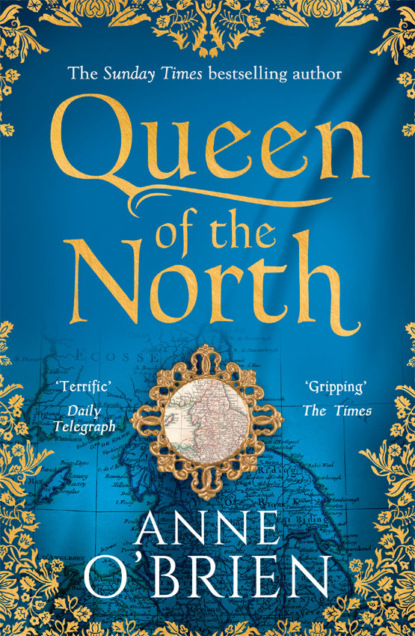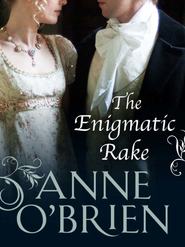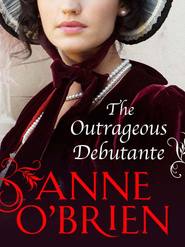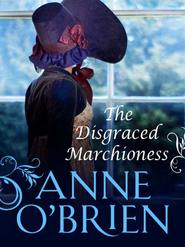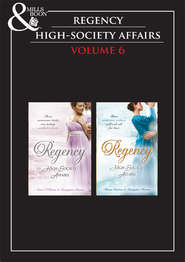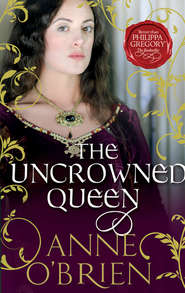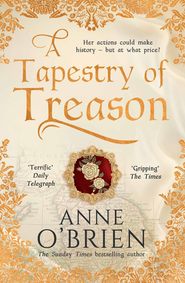По всем вопросам обращайтесь на: info@litportal.ru
(©) 2003-2024.
✖
Queen of the North: sumptuous and evocative historical fiction from the Sunday Times bestselling author
Настройки чтения
Размер шрифта
Высота строк
Поля
Broken hearts suddenly became a real fear. But for whom? All I knew in my own heart was that the resolution of these events would never be to Isabelle’s contentment.
I waited, carved emblems of royal power pressing down upon me in case I should forget who was King of England. Would he be in shackles? I thought it not appropriate that he should be.
Even at this moment of high anxiety, the Great Hall at Westminster, newly furnished and embellished, heralded the power of King Richard the Second. His personal emblem, the white hart, collared in gold, was repeated again and again, with a throng of heavenly angels carved at the end of each beam in the great hammer-beam roof. Each angel carried a shield, the majesty of the fleur-de-lys of France quartered with the three leopards of England. Richard’s heraldic symbol. This was Richard’s hall, built by him, with a new throne that he had had carved, complete with a gilded cushion, positioned on the dais for all to see.
I was here because I had been told that Richard was coming. I was here because I thought it my duty to be here to witness the return of my cousin.
Without warning the great doors were dragged back; in marched an armed guard, and there at the centre of their protection, or perhaps their containment, walked King Richard.
The guard came to a halt and so did the King.
I could not take my eyes from his face.
Never had I seen Richard so unkingly, whether in demeanour or in apparel. Pale, dishevelled, his soft lips pressed hard together, he stared around him as if he had still to accept where he was and why he was here, hemmed in by soldiers not in his livery. Without thought, so it seemed to me, he was plucking at the hem of his tunic, a garment that he might have been wearing for the whole of the journey from Wales, so travel-worn and stained as it was. His boots were covered in dust, and his hose to the knee. His eyes looked wild and uncomprehending as if he had been pushed beyond his bearing. Strained, even hollow-cheeked, he might not have eaten a good meal since he had fallen into Lancaster’s hands.
At last Richard’s vacant gaze fell on me, so that I stepped forward, and from a lifetime of custom and loyalty I curtsied. The King made no sign of recognition. At close quarters, his eyes were glassy as if unknowing of what was expected of him. Perhaps that was the problem, I thought, watching the febrile glance he cast this way and that. For the first time in his adult life nothing was expected of him. He was not in control of who must do what at his royal command. And I realised the enormity of what had happened. What Lancaster had done. What we had done. Whatever my ambitions for my Mortimer family, Richard was the true heir. No one could promote a legitimate case for his not wearing the crown. His blood was true in descent from King Edward the Third, eldest son to eldest son. Yet what hope was there for him now?
Compassion touched my mind, as it had for Isabelle.
As he was led away, his shoulders bowed, I knew that Richard would never again take his seat on the throne beneath the angelic throng.
Fleetingly, I wondered if Isabelle would be allowed to see him.
More critically, as I watched Richard being escorted to some place of confinement, I wondered if Lancaster was still intent on keeping his oath, that he would not disturb the true inheritance. A warm fear rose to fill every space in my mind, in my heart. What we had done, whatever it might be, was irrevocable. I could not yet see with any clarity the road that I would be forced to tread. And beneath the fear, struggling to be born, was just the faintest breath of guilt.
Chapter Five (#ulink_eb555700-0dd5-54bd-aadf-e5de2c434051)
Westminster: 13 October 1399
Cold and cramped, I stood in my chamber in the rambling palace of Westminster, clad in robes that were not of my choosing although the fit was remarkably good, aided with a pin and a stitch here and there. Opposite me stood Harry, even more resplendent, hands fisted on his hips. Harry looked uneasy as if he would rather be in hunting leathers or readied for some Scottish skirmish, but there was a determination in the rigidity of his jaw as he carried the finery of a full-skirted, ankle-length houppelande well, with its dagged sleeves and ermine edges. The draped folds of the chaperon, set squarely on his head as if some furred animal, all fringed with gold, was of a similar hue. Unfortunately Henry of Lancaster had not considered Harry’s red hair in the choice of garments.
‘Well?’ he asked, under my critical gaze.
I was in no mood for doling out admiration.
‘I am not in agreement with this,’ I announced.
‘As you have made more than clear for the past se’nnight. But you will do it because I ask it of you,’ was all the reply I got.
‘Or because you order me to do it and I will concur, as a good wife should obey her husband.’
‘If you wish. This is not the time for soul-searching, Elizabeth. We are here. We have walked at Lancaster’s side every day, acknowledging all he has done. This is the culmination of all the weeks since we met with him at Doncaster.’
‘Weeks in which the Earl your father broke as many oaths as did Lancaster. When Lancaster swore to bow before those with a superior claim to the throne.’ I gave Harry no quarter. ‘Of which there are two. Our erstwhile King Richard, now a prisoner, and then Edmund Mortimer, Earl of March. What happened to all the fine words at Doncaster? Trampled, it seems to me, under the joint mail-shod feet of Lancaster and Northumberland.’
These were weeks in which the Earl of Northumberland had played a significant, some would say an inglorious, role to ensure Lancaster’s ultimate victory, plotting with habitual cunning to take control of Richard who had sought refuge in Conwy Castle on his return from Ireland. The Earl swore that Lancaster did not desire the throne, swore his own firm allegiance to King Richard, before taking him into custody and dropping him into the waiting hands of Lancaster at Flint Castle. Richard’s friends and erstwhile counsellors had promptly made themselves scarce or sided with the Earl of Northumberland who promised them safe passage in his retinue.
‘Lancaster did not get where he is today merely by force of arms.’ Harry was glaring at my intransigence. He was in no mood to admire my own appearance either. The deep red of velvet and damask complemented my own dark colouring.
‘No. He was led to the throne by self-serving magnates like the Duke of York, who conveniently changed sides when Richard capitulated to your father at Conwy and they saw which way the wind was blowing. But Percy arms played the major part in this travesty. Lancaster is not the heir. This is wrong, Harry!’
‘Wrong it may be, but this is what will happen.’
‘And your voice will not be raised against it?’
He stalked to where a flagon of ale and cups had been left for us, poured, emptied one in a gulp and gave another to me as he replaced his on the board with a smart thump.
‘Of what value would that be, to raise one voice in the midst of thousands? Lancaster has been acclaimed by the rabble in the streets and by the lords and clerics at Westminster. One voice will not be heard amongst the rest.’ He scowled down at his feet clad in softest unscuffed leather. ‘Nor am I sure that I wish it to be.’ He looked up at me under his brows. ‘There is so much validity in Lancaster’s claim. The Earl of March is too young, too untried, and the female line of his royal descent disliked by so many. The old King, your great-grandfather, saw the weakness of it when he issued a decree that after his death only males would inherit. Which neatly obliterated your mother’s claim in spite of her Plantagenet blood. Yes, I know what you will say…’ when I opened my mouth to argue, ‘but it’s a matter of right of inheritance against the demands of political expediency. I’ve thought much of this and…’
‘You have changed your mind, haven’t you? You will give your wholehearted allegiance to this man who fooled us with his mummer’s oath-taking.’
I was baffled, horrified, that he had done so after our hearts and minds had seemed so closely in tune. Here was my husband, comfortably in political alliance with Henry of Lancaster. Disappointment was sour in my belly, churning with the acknowledgement that it would be beyond my powers to change Hotspur’s mind, once it was fixed on the vision before him, whether it be the enemy across the battlefield or the usurper who already had the crown in his hand.
‘Yes, for the most obvious of reasons. Young Edmund should be King, I’ll not deny it, but it may be that our own power in the north will be more secure with a friendly Lancaster than a young boy who cannot hold the reins of power.’
‘Unless Lancaster becomes unfriendly and decides to strip it from you!’
‘He owes us too much to do that. There is no real support for Mortimer, and as you see, it is overwhelming for Lancaster. So I think in the circumstances to support the Earl of March would not be politic.’
‘Does that make his claim an empty one?’ I would propound every argument at my disposal to change his mind, quick anger surprising me, glossing my words with fiery eloquence. ‘You know that it does not. It is no empty claim. Richard was crowned King as a child, little older than Edmund Mortimer. With a strong council England suffered no hardship. A child King did not cast England into revolt or attack from abroad. My nephew is the legitimate heir, and if the crown does not sit legitimately, what stability will it give this kingdom? The power will be on offer to every magnate who has ambition to seize it for himself. It should undeniably be Mortimer, not Lancaster.’
‘I accept all that you say, but you can’t argue legitimacy, Elizabeth. We unseated Richard fast enough when it suited us.’
‘That was not Lancaster’s sworn intention when he made that thrice-damned oath. We were all fooled. But if Richard is not King, it should be Edmund Mortimer by the right of his mother’s blood and his father being King Edward’s second son. You know that is the truth of it, but have clearly rejected it for the sake of your own power. Because it is politic.’ I drew breath. ‘And when were you going to tell me?’ My anger was now hot beneath my sleek fur. ‘I doubt your father gives any credence to the Mortimer claim either.’
‘I doubt it too.’ Harry found the need for another cup of ale. ‘Whatever the rights and wrongs of it, here we are, trussed up like Christmas geese, and today Henry of Lancaster will be crowned King. Are you ready?’
I spread my arms. ‘Do I look ready? Lancaster has paid for the clothes on my back!’
‘You look magnificent.’
‘So do you look magnificent, but to what purpose?’ Even in my anger, he was beautiful. ‘There’s no need to be concerned. I will do you proud.’ My jaw was as tense as his.
‘Are you going to drink that?’ I still held the untouched cup in one hand. ‘I suggest you do. It will give you a mellow edge. And try to be polite. At least there will be no possibility of your conversing with your regal cousin until after the event, when he will be your King. It might put a curb on your tongue.’
I bared my teeth, and drank. For Harry’s sake, and because I foresaw no good in creating dissention at this late point in the proceedings. I resolved, for this day at least, to be the perfect subject.
‘I will curb my tongue today. But don’t hazard your Percy acres on my being mellow tomorrow.’
Despite the desultory rain, the coronation of Henry, Duke of Lancaster, was an affair to be remembered in later years, when men gathered in alehouses or in their lordly castles, reminiscing over small beer and Bordeaux wine. As Harry had announced, my cousin Henry had been acclaimed King by the lords and commons, led to the vacant throne in Westminster Hall by his royal uncle the Duke of York and the Archbishop of York, thus awarding him the highest of commendations from church and state. This sacred crowning was merely the culmination in Westminster Abbey, ratifying the choice of the people of England in the sight of God. He had not taken the crown by force, although the rightness of Richard’s imprisonment and the purloining of his crown was open to question. Lancaster had been invited to be King. Both Harry and the Earl had joined the lords to acclaim Lancaster King of England.
I considered him an oath-breaker.
Now, bareheaded but clad in cloth of gold, with nine water fountains teeming with red wine to win over the populace in Cheapside, Lancaster became King Henry the Fourth of that name.
Anger seethed afresh, despite my promise to guard my demeanour, as the ceremony unfolded. I nudged Harry, angling my chin toward the procession where the great swords of state were being carried in before the usurper monarch. Four of them rather than the traditional three. The two swords of justice bound in red and gold were carried by the Earls of Somerset and Warwick. Curtana, the blunt sword of mercy, was held aloft by Lancaster’s eldest son who would now be designated Prince Henry. And processing before them all?
‘Did you know about this?’ I asked.





